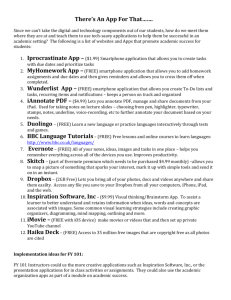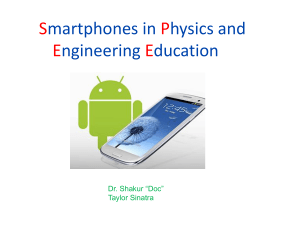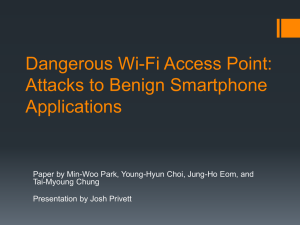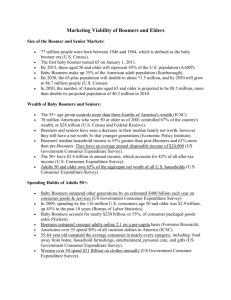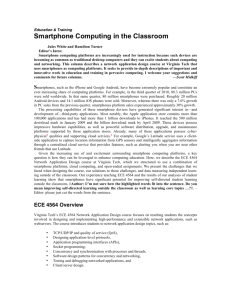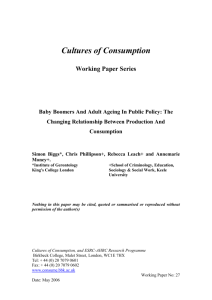Request for Research Grant Proposals
advertisement
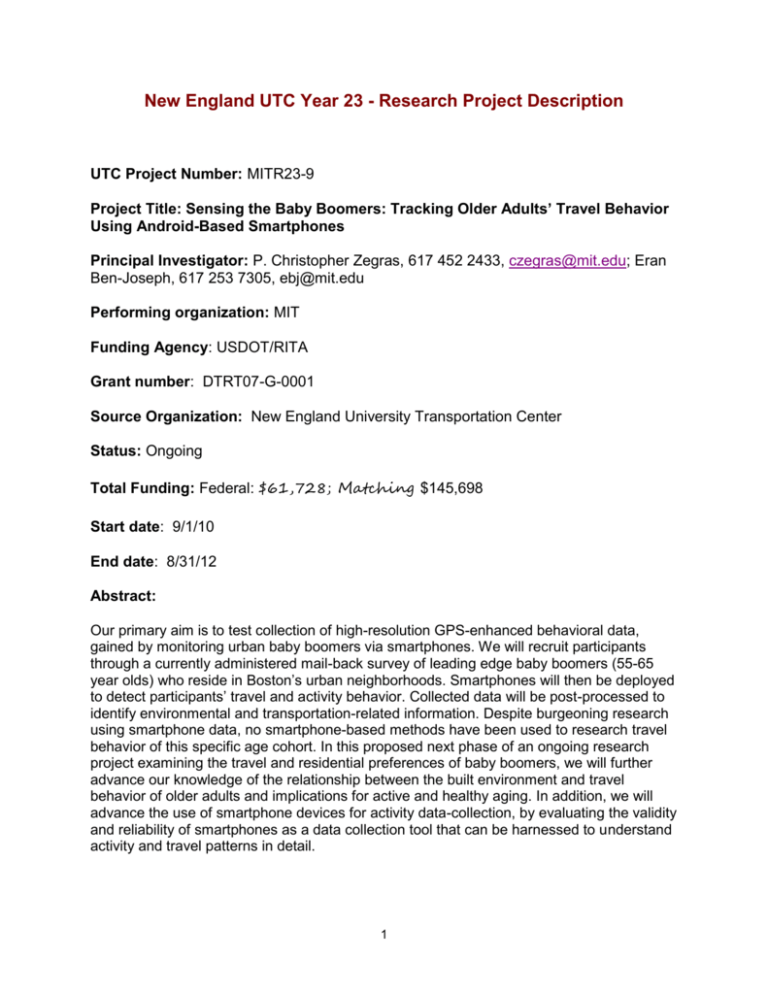
New England UTC Year 23 - Research Project Description UTC Project Number: MITR23-9 Project Title: Sensing the Baby Boomers: Tracking Older Adults’ Travel Behavior Using Android-Based Smartphones Principal Investigator: P. Christopher Zegras, 617 452 2433, czegras@mit.edu; Eran Ben-Joseph, 617 253 7305, ebj@mit.edu Performing organization: MIT Funding Agency: USDOT/RITA Grant number: DTRT07-G-0001 Source Organization: New England University Transportation Center Status: Ongoing Total Funding: Federal: $61,728; Matching $145,698 Start date: 9/1/10 End date: 8/31/12 Abstract: Our primary aim is to test collection of high-resolution GPS-enhanced behavioral data, gained by monitoring urban baby boomers via smartphones. We will recruit participants through a currently administered mail-back survey of leading edge baby boomers (55-65 year olds) who reside in Boston’s urban neighborhoods. Smartphones will then be deployed to detect participants’ travel and activity behavior. Collected data will be post-processed to identify environmental and transportation-related information. Despite burgeoning research using smartphone data, no smartphone-based methods have been used to research travel behavior of this specific age cohort. In this proposed next phase of an ongoing research project examining the travel and residential preferences of baby boomers, we will further advance our knowledge of the relationship between the built environment and travel behavior of older adults and implications for active and healthy aging. In addition, we will advance the use of smartphone devices for activity data-collection, by evaluating the validity and reliability of smartphones as a data collection tool that can be harnessed to understand activity and travel patterns in detail. 1 Objective: We intend to demonstrate the possibilities for using smartphones to obtain highly resolved behavioral information for older adults, specifically leading edge baby boomers. Towards this end, we aim to implement a pilot study which will help to establish the foundation for larger-scale, widely-applicable, and more-reliable smartphone-based travel and activity data collection efforts for the baby boomer cohort, and beyond. The ultimate objectives are: • To draw upon innovations in communications technologies to enhance travel survey data collection; • To develop a non-intrusive tool that may be widely used for travel survey purposes; and • To gather data to be used for advanced transportation modelling. Task Descriptions: Our tasks include: • Development of a Smartphone-based app, which is lightweight (computationally) and non-intrusive to the user. The purpose is to identify stops, transfers, modes, etc. with little user interaction and with energy efficiency (battery wise). Together with colleagues in Singapore and Portugal, we have developed and piloted an Androidbased app and continue developing an iPhone-based app, now made more feasible with the latest operating system (iOS 5) in October 2011. Current Android app design • Development of a web interface, which enables initial user registration, plus validation capabilities of the activities recorded by the smartphone app. The purpose of the interface is to be highly intuitive for the user, with minimal burden. For example, the interface currently includes heavy use of icons/symbols and mapbased interfaces for validation. 2 Example of web-interface design • Development of intelligence capabilities to infer activities, modes, transfers, stops, etc. This work requires back-end processing capabilities and algorithms that can provide automated and reliable inferences about the daily activities logged. In this way, the user inputs necessary for validation via the web interface (described in previous point) is minimal. The algorithms continue to be refined based on pilot app implementation, currently among partners in Singapore. • Seamless smartphone-web-server integration. This work entails the architecting and implementation of database and back-end intelligence with the user web interface and the smartphone app. The challenges include cache and buffer adjustment, creating indices for speeding queries, understanding constraints to scalability, examining alternative server architectures to improve scalability (for more users). Current work focuses on prototyping the server architecture on a new server and further evaluating and analyzing performance and scalability. Technology Transfer Activities: Currently technology transfer activities have been modest, as the focus has been on technology development. The work was presented as a poster at the 9th International Conference on Transport Survey Methods (ISCTSC 2011), in November, 2011 in Chile and will be presented at two TRB sub-Committee meetings at the TRB Annual Conference in January 2012. We have been in discussion with one State Dept. of Transportation which is interested in piloting the technology in an upcoming state-level individual travel survey. Potential Benefits of the Project: This project has the potential to fundamentally transform the types of data collection methods used in travel survey analysis and the quality of that data – ultimately making such data collection more regular, more reliable, and more cost effective. In addition, by working with partners in Portugal and Singapore, and continuously exploring the possibilities for piloting the approach elsewhere, we have the chance to: 1. Test the robustness of the approach in different contexts; 2. Develop an initial comparative dataset on travel behavior among the boomers and others from a range of different contexts. 3
